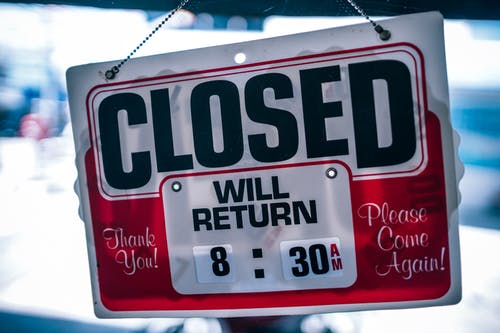Exiting the Franchise
The time will come to sell your franchise. Maybe it’s due to being ready for retirement, heath concerns, loss of a partner or just simply being burnt out. We will discuss some tips to get you ready now. The better prepared you are now – the better the resale value when you are ready and that could be sooner than you planned.
Below are considerations:
1) Keep your books clean – Do not mix business and personal finances. I lost track of the number of businesses that I considered purchasing with incredible “add backs”. The typical use of add-backs is when an owner uses business funds for personal use. There may be legitimate add-backs, but my rule is if you told the government it was for business on your tax returns – that is part of the business cost. If you are doing that now – you will need to change and have at least three years of clean records. Otherwise do not expect top dollar when you sell. One lesson we learned is we had no intention of selling and operated multiple business under the same corporate name. This made it difficult to work with financial institutions even with CPA statements. They wanted a tax return that only had the entities for sale and that was not possible.
Small Business, Big Lessons: What Happened to My Favorite Dickey’s Barbecue Pit location?
2) Consider a business broker – Trying to sell a business on one’s own is possible but can be difficult. A good business broker will advertise for you and screen out people that do not have the financial capabilities. The franchise may also have a resale arm. Research both and understand the urgency they will have acting on your behalf. This will allow you to continue to focus on business results.
3) Financing – Small businesses can be difficult to finance. Unless the person purchasing has cash, home equity or other sources for funding – they will require a loan. Best case a financial institution with or without an SBA guarantee will fund it. Worst case is owner financing. If you end up providing owner financing – understand that the cash you get at closing may be the only money you will ever see. Ensure you have an attorney draft the paperwork but understand your risk and limits of what you can reclaim. Remember assets are typically worth a fraction if a business closes, verses that of an ongoing concern.
4) Ongoing liabilities – Be sure to work with your attorney and financial professional to ensure how you sell the business (assets vs stock) to minimizes your longer term liabilities such as lease or purchase guarantees. Know the exposure you have and factor that into your selling decision.
Think through
It is better to “plan” your exit while you are still fully engaged in your business. Many people wait until they are burnt out or near bankruptcy. At that point the books are not clean. This may lead to a longer sales cycle and fire sale prices. Keep your books clean and start preparing well in advance of when you plan to sell. Remember, life happens, and you need to be ready for unexpected twists and turns.
This column is the conclusion of a larger series on franchising. Other entries include “Secrets of Franchising,” “Know Thyself Before Investing,” “What They Don’t Want You to Know About Franchising.” and “Running a Successful Franchise`.”
About the Author:
 Gregory Woloszczuk is an entrepreneur and experienced tech executive that helps small business owners grow their top and bottom line. Gregory believes in straight talk and helping others see things they need to see but may not want to with a focus on taking responsibly for one’s own business. He and his wife, Maureen, started GMW Carolina in 2006.
Gregory Woloszczuk is an entrepreneur and experienced tech executive that helps small business owners grow their top and bottom line. Gregory believes in straight talk and helping others see things they need to see but may not want to with a focus on taking responsibly for one’s own business. He and his wife, Maureen, started GMW Carolina in 2006.
Related Stories
‹

Small Business, Big Lessons™ - Running a Successful FranchiseRegardless of franchises or independent business, step one is for you to “own” the business and its success. In today’s “Small Business, Big Lessons,” we will discuss leveraging all your franchisee resources but no matter the support or lack of support – your name is on the business as its owner and staying focused on […]

Small Business, Big Lessons™ - What They Don't Want You to Know About FranchisingInsider Secrets for Researching a Franchise – What They Don’t Want You to Know! In this continuation of our special franchising series, we will share information most franchisors do not want you to know. At this point you have decided to pursue a franchise concept. You believe it may be a fit for you. You […]

Small Business, Big Lessons™ - Secrets of FranchisingTalking about franchising means talking covering a range of topic, from first becoming a franchisee to how to exit the business. In my experience being a franchisee for 10 years, subsequently selling that business, being elected as an owner representative for the national marketing fund and becoming an area developer, I’ve filled a variety of […]

Small Business, Big Lessons® - Celebrating 3 Years!Time flies when you are having fun. It is hard to believe the Small Business, Big Lessons column is celebrating 3 years. This week will be a walk down memory lane and how it started. Our business had been advertising for years with WCHL and Chapelboro.com. I’ve had the pleasure of being interviewed by Ron […]

Small Business, Big Lessons® - Measure Twice, Cut OnceEver hear the saying “measure twice and cut once?” It is what carpenters live by. It means taking the time to ensure your accuracy before cutting a piece of wood. There’s nothing worse than needing to go back to the lumber yard to finish a job or try to make something fit – especially if […]

Small Business, Big Lessons® - Local Spotlight on FitnessAmong the businesses hit hardest by Covid-19 is the fitness industry. I had the opportunity to interview local business owner, Dana Harshaw. Dana owns and operates Barre3 (pronounced bar three) in Chapel Hill. She is the local owner within a franchise system of over 140 locations. We spoke about the challenges, opportunities and concerns owning and […]

Small Business, Big Lessons ®: How to Apply 60/30/10Most people have heard of 80/20. Such as 80% of your business comes from 20% of your customers. The concept of 60/30/10 is how one can allocate investments including time. Too many times if you ask anyone – what does a day in the life look like – it will turn into a laundry list […]

Small Business, Big Lessons®: Three Things Big Government Can Learn from Small BusinessWith the continuing COVID-19 challenges, small businesses must continue to innovate to survive. Given limited resources, small businesses are forced to stay engaged and make difficult tradeoffs. What if elected leaders applied some small business foundational rules to government functions? Let’s look at three areas: budgeting, leadership, and urgency. 1) Budgeting – Wouldn’t it be great […]

Small Business, Big Lessons®: Time for a New PlanWith many capacity restrictions on business, it is a requirement for survival to revisit your original business assumptions. What is in the well overused terminology the “new normal” for your business? It may be necessary to start with a blank page. Let’s looks at core assumptions and how to move forward or maybe not… 1) Back […]

Small Business, Big Lessons®:Ready to Reopen - Safely - COVID-19 editionAs many States enter Phase One of reopening local businesses, employee and customer safety remain a top priority. Additionally, keeping the business financially afloat is right behind that. If not careful, what sounds good on the surface, PPP (Paycheck Protection Program) loans could tank your business. 1) Safety – A few resources for reopening are the CDC, FDA, and OSHA. […]
›
 Gregory Woloszczuk is an entrepreneur and experienced tech executive that helps small business owners grow their top and bottom line. Gregory believes in straight talk and helping others see things they need to see but may not want to with a focus on taking responsibly for one’s own business. He and his wife, Maureen, started GMW Carolina in 2006.
Gregory Woloszczuk is an entrepreneur and experienced tech executive that helps small business owners grow their top and bottom line. Gregory believes in straight talk and helping others see things they need to see but may not want to with a focus on taking responsibly for one’s own business. He and his wife, Maureen, started GMW Carolina in 2006.











